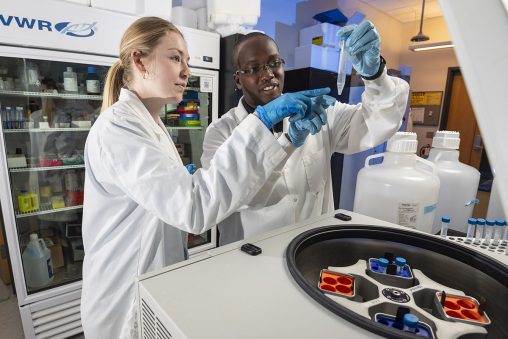
Accreditation by the American Society for Biochemistry and Molecular Biology means that Wright State’s bachelor’s degree in biochemistry and molecular biology meets rigorous national standards.
Wright State University’s Bachelor of Science in Biochemistry and Molecular Biology program has been accredited by one of the leading molecular life science societies in the world.
The undergraduate degree program, which is offered by Wright State’s College of Science and Mathematics, received full accreditation for seven years from the American Society for Biochemistry and Molecular Biology. The accreditation runs through 2030.
Accreditation by the society is a national, independent, outcomes-based evaluation mechanism that recognizes excellence in bachelor’s degree programs in biochemistry and molecular biology and related disciplines.
The accreditation means that Wright State’s bachelor’s degree program meets the national standards for education in biochemistry and molecular biology, said Eric Bennett, Ph.D., chair of neuroscience, cell biology and physiology and interim chair of biochemistry and molecular biology.
“It’s significant to have a group of recognized leaders of biochemistry and molecular biology in the country who recognize that our program meets the objectives and learning outcomes associated with a Bachelor of Science in Biochemistry and Molecular Biology,” he said.
Chad Campbell, Ph.D., lecturer of biochemistry and molecular biology, said the accreditation signals to students that Wright State’s undergraduate degree is on par with larger programs in Ohio and nationally.
“We’ve been identified as a program that meets the highest standards,” he said.
In its evaluation, the American Society for Biochemistry and Molecular Biology praised Wright State’s program for providing students with numerous opportunities to work on teamwork skills and emphasizing communication skills across multiple courses.
“A big part of science is the ability to communicate the information that you have to others in your field, and that is one of the things we push from freshman year to senior year, to be able to write it and to be able to present it,” Campbell said.
The program was also applauded for helping students understand career opportunities and how to prepare for them.
The program provides students with hundreds of hours of hands-on lab time and opportunities to work on cutting-edge research through independent studies and undergraduate research projects.
“Research is massively important toward our degree as we’re a graduate-filtering degree,” Campbell said.
Wright State’s Bachelor of Science in Biochemistry and Molecular Biology program prepares undergraduate students for careers in medicine, health, drug manufacturing and design, agriculture, forensic science, academic and industrial research and scientific writing.
Students are also prepared to pursue graduate and professional degree programs in such fields as human and veterinary medicine, physical therapy, physician assistancy, dentistry, pharmacy and optometry.
The Department of Biochemistry and Molecular Biology offers a dual degree program in which students can earn both a bachelor’s degree and a master’s degree in five years.
“The fact that this undergraduate degree program has merged into a combined degree program is a win-win for all of our students,” Bennett said.
Many biochemistry and molecular biology students participate in Wright State’s award-winning International Genetically Engineered Machine (iGEM) team. Last fall, the team of 11 students won a gold medal at the iGEM Grand Jamboree, an international synthetic biology competition for young STEM researchers. The team earned a silver medal in 2022 and a bronze medal in 2021.
The students are mentored by scientists from the Air Force Research Laboratory and Wright State’s College of Engineering and Computer Science and the Department of Biochemistry and Molecular Biology, including Madhavi Kadakia, Ph.D., vice provost for research and innovation, who is a faculty member in the department.

 Wright State psychology team studies ways to identify fatigue in pilots, drivers
Wright State psychology team studies ways to identify fatigue in pilots, drivers  Wright State videographer Kris Sproles wins Regional Emmy and Ohio journalism award
Wright State videographer Kris Sproles wins Regional Emmy and Ohio journalism award  Wright State Boonshoft School of Medicine ranked among the nation’s best for 2024 by U.S. News
Wright State Boonshoft School of Medicine ranked among the nation’s best for 2024 by U.S. News  Exposing biotechnology
Exposing biotechnology  Wright State faculty member Dan Noel uses unique background to inspire new leaders
Wright State faculty member Dan Noel uses unique background to inspire new leaders 